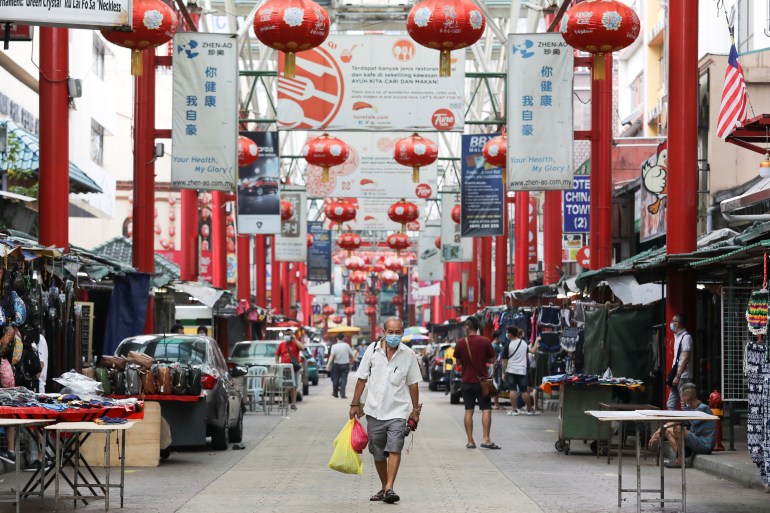‘Total disaster’: Shanghai lockdown puts livelihoods under strain
Restauranteurs and other small business owners struggle as lockdown brings China’s biggest city to a halt.

Hong Kong, China – When more than 26 million Shanghai residents were sent into lockdown last week, restaurateur Cotton Ding’s heart sank.
“We have been fighting the pandemic since 2020, and for the past two years we’ve experienced a lot of changes,” Ding, who owns two restaurants located in historic colonial villas in the heart of the former French Concession, told Al Jazeera.
Keep reading
list of 4 itemsPakistan latest updates: Court rules Khan’s move unconstitutional
Bank of Japan member stresses easy policy despite rising costs
Samsung Electronics reports 50 percent jump in quarterly profits
“We were finally getting back on our feet, business had recovered and was doing a little better, then the recent outbreaks and lockdowns hit.”
Spring would normally be Ding’s busiest period, with guests taking advantage of her leafy patio to enjoy the balmy Shanghainese weather.
Instead, business has been “a total disaster”, she said, due to the lockdown, which authorities this week extended to cover the entire city indefinitely after a two-phase lockdown introduced on March 28 failed to bring coronavirus cases under control.
“Usually we hire and train new staff to cater for this time, upgrade our furniture settings and bring the garden to life,” she said.
“Now we have been ordered to shut our doors and we anticipate that we will be closed for most of April.”
Ding said she has no idea when she will be able to reopen or go back to full capacity.
“The worry has not allowed me to sleep well at all,” she said.

Since the start of March, authorities in China’s most populous city have reported more than 114,000 cases, far exceeding the nationwide caseload of the previous two years. On Thursday, Shanghai recorded 19,982 cases, its highest daily figure yet.
Chinese officials have described the outbreak as “extremely grim” and sent tens of thousands of healthcare workers to help contain infections in the city, including military personnel.
Nevertheless, authorities have yet to report any deaths in the city – an anomaly that has fuelled scepticism about China’s official figures.
Amid the mounting economic toll of China’s zero-tolerance approach to the virus, known as “dynamic zero COVID”, there are signs that public patience is wearing thin.
Videos circulating on social media have shown residents struggling to buy basic necessities like food and water, due to the closure of supermarkets remain and overburdening of delivery services. Other residents have posted videos complaining about overcrowding and unsanitary conditions at the city’s mass quarantine centres, including soiled shared toilets and a lack of showering facilities.
In one video posted online, a woman can be seen begging to leave her compound to get her husband cancer treatment. Residents also expressed outrage over the separation of COVID positive children from their parents, leading authorities on Wednesday to bow to public pressure and ditch the policy.
A protracted shutdown of China’s economic powerhouse would have far-reaching economic consequences at home and further afield. Shanghai is the country’s most important financial and manufacturing base, with its output accounting for 4 percent of China’s gross domestic product (GDP). The city is also home to the world’s largest port, handling about 20 percent of China’s exports overseas.
Xia Le, chief Asia economist at Banco Bilbao Vizcaya Argentaria (BBVA), told Al Jazeera that the economic impact of the lockdown would depend on its duration.
“If the lockdown only lasts for two months, say April and May, it will trim China’s growth by 0.3-0.5 percent this year,” Xia said. “If the lockdown lasts throughout the third quarter, it will cut China’s growth by 1.5-2 percent.”
Xia said China would be unable to meet its 5.5 percent official growth target if the lockdown continued beyond June “even if authorities were to deploy more pro-growth policies”.

Beijing has warned of strong headwinds facing the economy this year, including the effect of the pandemic, although it has given no indication it intends to fundamentally alter its zero-tolerance approach.
Activity in the country’s services sector contracted at the quickest pace in two years in March, according to official Chinese government data, with the non-manufacturing Purchasing Managers’ Index (PMI) falling to 48.4, from 51.6 the previous month.
A private sector survey paints an even bleaker picture. According to a report released by Caixin on Wednesday, China’s PMI fell to 42 in March from 50.2 in February, the lowest level since the beginning of the pandemic in February 2020.
“Overall, both manufacturing and services activities weakened in March due to the epidemic,” Caixin Insight Group senior economist Wang Zhe said in a statement. “Similar to previous COVID outbreaks in China, the services sector was more significantly affected than manufacturing.”
“Policymakers should look out for vulnerable groups and enhance support for key industries and small and micro businesses to stabilise market expectations,” Wang said.
As the rest of the world learns to live with the virus, China’s uniquely strict policies have also raised questions about its competitiveness in a global economy where pandemic restrictions have been mostly consigned to history.
“Chinese exporters will lose more orders to their foreign competitors in a real ‘open’ economy,” said Xia, the BBVA economist. “China is expected to have less foreign direct investment before it reopens its economy. In the meantime, international investors might become less interested in Chinese assets.”
Xia said the zero COVID strategy would not be sustainable in the long run.
“I am not saying that they should abandon this strategy immediately, but it’s time to reassess the strategy and make the change at some point,” he said. “A sensible transition plan will strike a good balance between saving lives and maintaining economic prosperity.”
Anxiety and stress
For Ding, the Shanghai restaurateur, the last few weeks have been financially crippling.
“It has totally destroyed our cash flow,” she said. “As a small business, we will not be able to pay our rent, staff and suppliers straight away. It will take years for us to pay the debts.”
Ding said she is concerned for the welfare of her 50 employees, whose livelihoods she feels responsible for.
“The uncertainty has caused them a lot of anxiety and stress,” she said. “I’m in contact with them daily and they tell me they are worried and feeling unsettled.”
Chinese authorities have offered some financial support for businesses, including 140 billion yuan ($22bn) in tax relief and a three-month rent exemption for small tenants at state-owned entities.
“It is a tiny fraction of our losses and if you are not earning anything there isn’t much tax to pay anyways,” Ding said.
“Unfortunately for me, both my locations are privately owned and I will not receive the exemption. I will try to negotiate a discount with my landlords directly but as one of them was trying to up the rent by 15 percent recently it may be a hard deal.”